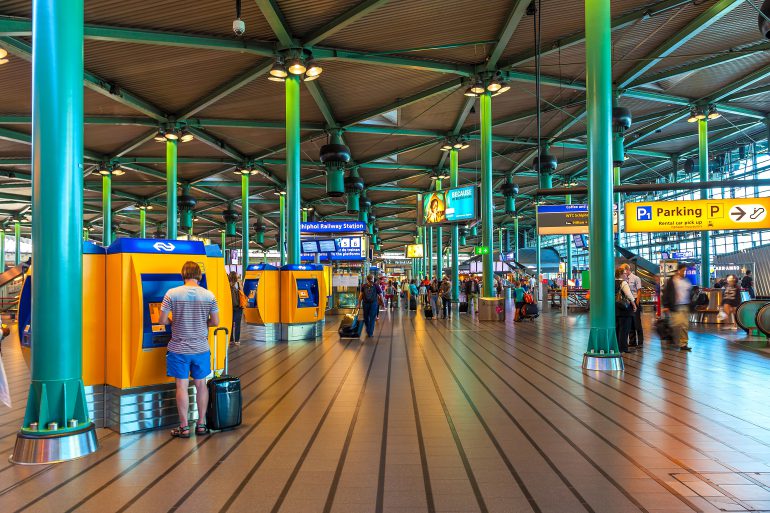Schiphol Airport, one of Europe’s busiest travel hubs, is at the centre of a growing crisis. Continuous rail servicedisruptions have impacted passengers and stirred concerns within the travel industry. These disruptions have raised alarms about the readiness of rail services to handle the influx of passengers, especially with the peak travelseason on the horizon.
For several months, passengers heading to or from Schiphol Airport have faced unexpected delays, cancellationsand reduced train services. These interruptions stem from a variety of causes, including technical malfunctions, emergency maintenance and infrastructure upgrades, leading to a situation where reliability seems more the exception than the norm.
The frequency and severity of these disruptions have escalated to a point where the airport has reportedly been compelled to demand answers and action from ProRail, the organisation responsible for the maintenance and operation of the Dutch rail infrastructure.
Impact on travellers
The situation has reached a critical point, particularly for those passengers who rely on train services to catch flights. Stefan Donker, a spokesperson for Schiphol Airport, emphasised the gravity of the disruptions. ‘For a significant number of our visitors, including tourists destined for Amsterdam, public transport is not just an option but a necessity. The cornerstone of this reliance is the assurance of a dependable train service,’ he noted. This dependency underscores the broader implications of the rail disruptions, extending beyond mere inconvenience toaffect the very accessibility of air travel for a large segment of passengers.
The airport’s plea for improvement and accountability from ProRail reflects broader distress within the travel ecosystem, resonating with concerns expressed by travel industry professionals and organisations. The repeated disturbances have not only tarnished the passenger experience but have also led to a financial toll on travellers. Missed flights,
last-minute alternative transportation arrangements, and the potential for disrupted travel plans impose additional, unplanned expenses on passengers.
Frank Oostdam, representing the Dutch Association of Travel Agents and Tour Operators (ANVR), noted thegrowing desperation within the travel sector. The anticipation was for a ‘smoother operation post the challenges we faced last autumn,’ he stated. ‘Contrary to these hopes, the reality has been different, with disruptions becoming almost routine. The uncertainty and anxiety this breeds for passengers, especially those with imminentflights, cannot be overstated. It’s not just frustrating; it fundamentally undermines the reliability of train travel as a viable option for reaching the airport,’ noted Oostdam.
Response from ProRail
ProRail has acknowledged the significant inconvenience for travellers and expressed a commitment to addressing the root causes of these disruptions. ‘The experience for passengers travelling to Schiphol by train has been farfrom satisfactory. We recognise the critical nature of this issue and are prioritising the resolution of these malfunctions,’ commented Jeroen Wienen, a spokesperson for ProRail. This commitment comes against thebackdrop of extensive maintenance efforts already underway, including the urgent upgrade of the Schiphol tunnel, avital component of the infrastructure that has surpassed its 40-year lifespan.
Diverse challenges and future outlook
Despite ProRail’s acknowledgement and efforts to mitigate the disruptions, there remains no immediate promise of a disruption-free future. The causes behind the interruptions are varied, ranging from technical failures within the rail system’s safety mechanisms to unexpected maintenance requirements. This complexity, coupled with reportedstaffing shortages, complicates rapid response efforts and prolongs the resolution of incidents, further exacerbating the impact on travellers.
Looking ahead, passengers may need to brace for continued, if not increased, disruptions. Planned infrastructure works, including significant renovations at Schiphol station and reduced train services during specific periods,indicate that the challenges are far from over.
These necessary upgrades, set to extend into 2028, are crucial for the long-term reliability of the rail service but pose short- to medium-term hurdles for travellers.
National implications and calls for action
The rail disruptions at Schiphol are symptomatic of broader issues affecting the Dutch rail network, as highlighted by the traveller association Rover. The organisation has voiced its disappointment with the state of national railservices, emphasising that the problem extends beyond Schiphol. ‘The accumulation of disruptions across thenetwork signals a systemic issue that demands immediate attention and action. ProRail must receive adequate funding and resources to undertake necessary maintenance and upgrades,’ urged Freek Bos, director of Rover.This call to action resonates with the need for a resilient and reliable rail system, capable of supporting not just the travel industry but also the broader public transport needs of the Netherlands.
Written by Nicole Bea Kerr
